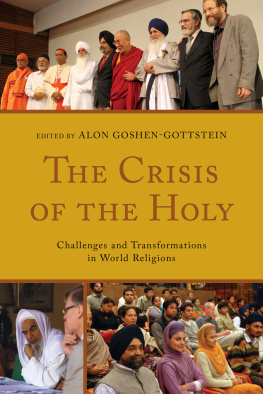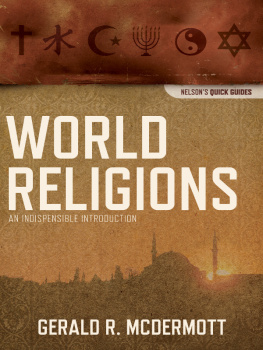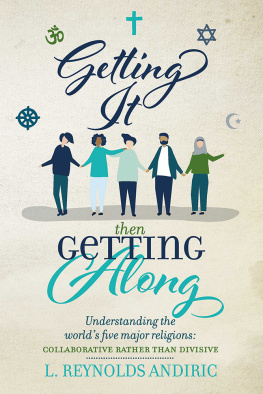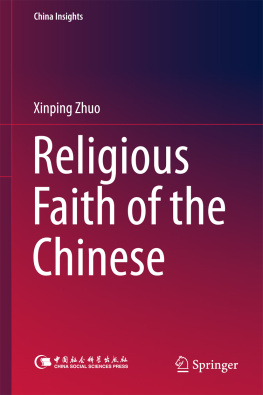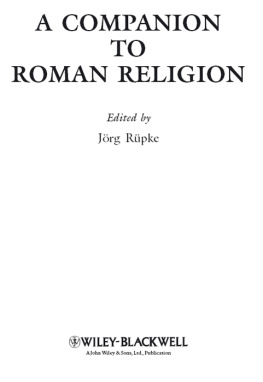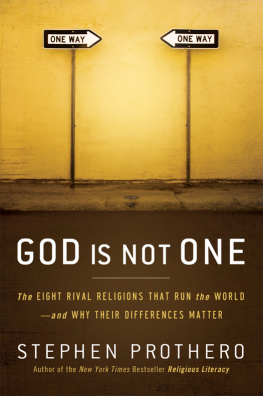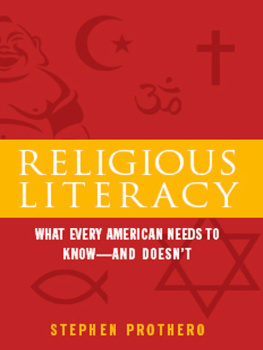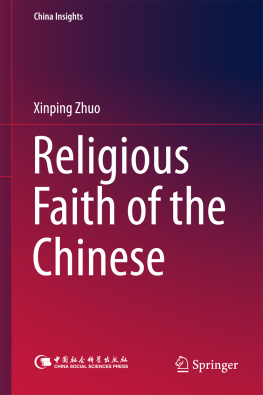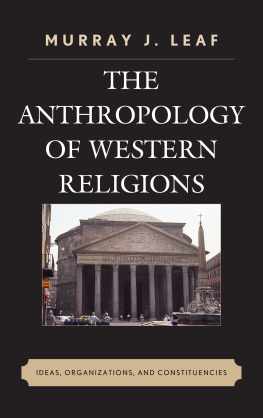Religions Sudden Decline
.
Religions Sudden Decline
Whats Causing it, and What Comes Next?
RONALD F. INGLEHART


Oxford University Press is a department of the University of Oxford. It furthers the Universitys objective of excellence in research, scholarship, and education by publishing worldwide. Oxford is a registered trade mark of Oxford University Press in the UK and certain other countries.
Published in the United States of America by Oxford University Press
198 Madison Avenue, New York, NY 10016, United States of America.
Oxford University Press 2021
All rights reserved. No part of this publication may be reproduced, stored in a retrieval system, or transmitted, in any form or by any means, without the prior permission in writing of Oxford University Press, or as expressly permitted by law, by license, or under terms agreed with the appropriate reproduction rights organization. Inquiries concerning reproduction outside the scope of the above should be sent to the Rights Department, Oxford University Press, at the address above.
You must not circulate this work in any other form and you must impose this same condition on any acquirer.
Library of Congress Cataloging-in-Publication Data
Names: Inglehart, Ronald, author.
Title: Religions sudden decline : whats causing it,
and what comes next? / Ronald F. Inglehart.
Description: New York, NY : Oxford University Press, 2021. |
Includes bibliographical references and index.
Identifiers: LCCN 2020027037 (print) | LCCN 2020027038 (ebook) |
ISBN 9780197547045 (hardback) | ISBN 9780197547052 (paperback) |
ISBN 9780197547076 (epub) | ISBN 9780197547083
Subjects: LCSH: ReligionHistory21st century. | ReligionForecasting. |
ScandinaviaReligion. | Religion and sociologyScandinavia. |
SecularismPolitical aspectsScandinavia. |
Political cultureScandinavia.
Classification: LCC BL51 .I624 2021 (print) | LCC BL51 (ebook) |
DDC 200.9/05dc23
LC record available at https://lccn.loc.gov/2020027037
LC ebook record available at https://lccn.loc.gov/2020027038
DOI: 10.1093/oso/9780197547045.001.0001
This book is dedicated with love to my wife, Marita, and to my children Milo, Ronald, Rachel, Elizabeth and Sylvia
Contents
The economic and cultural changes linked with modernization tend to bring declining emphasis on religionand in high-income societies this process recently reached a tipping point at which it accelerates. This book tests these claims against empirical evidence from countries containing 90 percent of the worlds population, explaining why this is happening and exploring what will come next.
Secularization has accelerated. From 1981 to 2007, most countries became more religiousbut from 2007 to 2020, the overwhelming majority became less religious. For centuries, all major religions encouraged norms that limit women to producing as many children as possible and discourage any sexual behavior not linked with reproduction. These norms were needed when facing high infant mortality and low life expectancy but require suppressing strong drives and are rapidly eroding. These norms are so strongly linked with religion that abandoning them undermines religiosity. Religion became pervasive because it was conducive to survival, encouraged sharing when there was no social security system, and is conducive to mental health and coping with insecure conditions. People need coherent belief systems, but religion is declining.
The Nordic countries have consistently been at the cutting edge of cultural change and can provide an idea of what lies ahead. They were initially shaped by Protestantism, but their 20th-century social democratic welfare systems added universal health coverage; high levels of state support for education, welfare spending, child care, and pensions; and an ethos of social solidarity. The Nordic countries are also characterized by rapidly declining religiosity. Does this portend corruption and nihilism? Apparently not. These countries lead the world on numerous indicators of a well-functioning society, including economic equality, gender equality, low homicide rates, subjective well-being, environmental protection, and democracy. They have become less religious, but their people have high levels of interpersonal trust, tolerance, honesty, social solidarity, and commitment to democratic norms. The decline of religiosity has far-reaching implications. This book explores what comes next.
These findings build on previous work with Pippa Norris, particularly Sacred and Secular: Religion and Politics Worldwide (Norris & Inglehart, 2004/2011). Despite Sacred and Secular s relatively recent publication, major changes have occurred since it appeared, and these changes shed new light on how religion is evolving.
I express my gratitude to the people who made the present book possible by carrying out the World Values Survey (WVS) and the European Values Study (EVS) in over 100 countries, from 1981 to 2020. My heartfelt thanks go to the following WVS and EVS principal investigators for creating and sharing this rich and complex dataset: Salvatore Abbruzzese, Abdel-Hamid Abdel-Latif, Anthony M. Abela, Marchella Abrasheva, Javier J. Hernndez Acosta, Olda Acuna, Mohammen Addahri, Q. K. Ahmad, Pervaiz Ahmed, Alisher Aldashev, Darwish Abdulrahman Al-Emadi, Abdulrazaq Ali, Fathi Ali, Rasa Alishauskene, Harry Anastasiou, Helmut Anheier, Jose Arocena, Wil A. Art, Soo Young Auh, Taghi Azadarmaki, Ljiljana Bacevic, Richard Bachia-Caruana, Erik Baekkeskov, Yuri Bakaloff, Olga Balakireva, Josip Baloban, David Barker, Miguel Basanez, Elena Bashkirova, Abdallah Bedaida, Jorge Benitez, Milo Bei, Jaak Billiet, Alan Black, Eduard Bomhoff, Ammar Boukhedir, Rahma Bourquia, Fares al Braizat, Lori Bramwell-Jones, Michael Breen, Ziva Broder, Thawilwadee Bureekul, Karin Bush, Harold Caballeros, Maria Silvestre Cabrera, Claudio Calvaruso, Pavel Campeaunu, Augustin Canzani, Daniel Capistrano, Giuseppe Capraro, Marita Carballo, Andres Casas, Nora Castillo, Henrique Carlos de O. de Castro, Chih-Jou Jay Chen, Pi-Chao Chen, Edmund W. Cheng, Pradeep Chhibber, Mark F. Chingono, Hei-yuan Chiu, Vincent Chua, Constanza Cilley, Margit Cleveland, Mircea Comsa, Munqith Dagher, Nria Segus Daina, Andrew P. Davidson, Herman De Dijn, Pierre Delooz, Nikolas Demertzis, Ruud de Moor, Carlos Denton, Xavier Depouilly, Peter J. D. Derenth, Abdel Nasser Djabi, Karel Dobbelaere, Hermann Duelmer, Anna Mia Ekstroem, Javier Elzo, Maria Fernanda Endara, Yilmaz Esmer, Paul Estgen, Marim Fagbemi, Tony Fahey, Nadjematul Faizah, Tair Faradov, Roberto Stefan Foa, Michael Fogarty, Georgy Fotev, Juis de Franca, Morten Frederiksen, Aikaterini Gari, Ilir Gedeshi, James Georgas, C. Geppaart, Bilai Gilani, Mark Gill, Timothy Gravelle, Stjepan Gredlj, Renzo Gubert, Linda Luz Guerrero, Peter Gundelach, David Sulmont Haak, Rabih Haber, Christian Haerpfer, Abdelwahab Ben Hafaiedh, Jacques Hagenaars, Loek Halman, Mustafa Hamarneh, Tracy Hammond, Sang-Jin Han, Elemer Hankiss, Olafur Haraldsson, Stephen Harding, Mari Harris, Mazen Hassan, Pierre Hausman, Bernadette C. Hayes, Gordon Heald, Ricardo Manuel Hermelo, Camilo Herrera, Felix Heunks, Virginia Hodgkinson, Hanh Hoang Hong, Nadra Muhammed Hosen, Joan Rafel Mico Ibanez, Kenji Iijima, Kenichi Ikeda, Fr. Joe Inganuez, Ljubov Ishimova, Wolfgang Jagodzinski, Meril James, Aleksandra Jasinska-Kania, Will Jennings, Anders Jenssen, Gubjrg Jnsdttir, Fridrik Jonsson, Dominique Joye, Stanislovas Juknevicius, Salue Kalikova, Tatiana Karabchuk, Kieran Kennedy, Jan Kerkhofs S.J., Kimmo Ketola, Nail Khaibulin, J. F. Kielty, Hans-Dieter Kilngemann, Johann Kinghorn, Kseniya Kizilova, Renate Kocher, Joanna Konieczna, Sokratis Koniordos, Hennie Kotze, Hanspeter Kriesi, Sylvia Kritzinger, Miori Kurimura, Zuzana Kus, Marta Lagos, Bernard Lategan, Francis Lee, Grace Lee, Michel Legrand, Carlos Lemoine, Noah Lewin-Epstein, Vladymir Joseph Licudine, Ruud Lijkx, Juan Linz, Ola Listhaug, Jin-yun Liu, Leila Lotti, Susanne Lundasen, Toni Makkai, Brina Malnar, Heghine Manasyan, Robert Manchin, Mahar Mangahas, Mario Marinov, Mirosawa Marody, Carlos Matheus, Robert Mattes, Ian McAllister, Nathalie Mendez, Rafael Mendizabal, Tianguang Meng, Jon Miller, Felipe Miranda, Mansoor Moaddel, Mustapha Mohammed, Jose Molina, Daniel E. Moreno Morales, Alejandro Moreno, Gaspar K. Munishi, Naasson Munyandamutsa, Kostas Mylonas, Neil Nevitte, Chun Hung Ng, Simplice Ngampou, Jaime Medrano Nicolas, Juan Diez Nicolas, Dionysis Nikolaou, Elisabeth Noelle-Neumann, Pippa Norris, Elone Nwabuzor, Stephen Olafsson, Muzzafar Olimov, Saodat Olimova, Francisco Andres Orizo, Magued Osman, Merab Pachulia, Christina Paez, Alua Pankhurst, Dragomir Pantic, Juhani Pehkonen, Paul Perry, E. Petersen, Antoanela Petkovska, Doru Petruti, Thorleif Pettersson, Pham Minh Hac, Pham Thanh Nghi, Timothy Phillips, Gevork Pogosian, Eduard Ponarin, Lucien Pop, Bi Puranen, Ladislav Rabusic, Andrei Raichev, Botagoz Rakisheva, Alice Ramos, Sonia Ranincheski, Anu Realo, Tim Reeskens, Jan Rehak, Helene Riffault, Ole Riis, Ferruccio Biolcati Rinaldi, Angel Rivera-Ortiz, Nils Rohme, Catalina Romero, Gergely Rosta, David Rotman, Victor Roudometof, Giancarlo Rovati, Samir Abu Ruman, Andrus Saar, Erki Saar, Aida Saidani, Pepita Batalla Salvad, Ratchawadee Sangmahamad, Rajab Sattarov, Vivian Schwarz, Paolo Segatti, Rahmat Seigh, Tan Ern Ser, Sandeep Shastri, Shen Mingming, Jill Sheppard, Musa Shteivi, Renata Siemienska, Richard Sinnott, Alan Smith, Natalia Soboleva, Ahmet Sozen, Michle Ernst Sthli, Gerry Stocker, Jean Stoetzel, Kancho Stoichev, Marin Stoychev, Katarina Strapcov, John Sudarsky, Edward Sullivan, Ni Wayan Suriastini, Marc Swyngedouw, Tang Ching-Ping, Farooq Tanwir, Jean-Francois Tchernia, Kareem Tejumola, Jorge Villamor Tigno, Noel Timms, Larissa Titarenko, Miklos Tomka, Alfredo Torres, Niko Tos, Istvan Gyorgy Toth, Jorge Aragn Trelles, Joseph Troisi, Ming-Chang Tsai, Tu Su-hao, Claudiu Tufis, Samo Uhan, Jorge Vala, Andrei Vardomatskii, Nino Veskovic, Amaru Villanueva, Manuel Villaverde, David Voas, Bogdan Voicu, Malina Voicu, Liliane Voye, Richard M. Walker, Alan Webster, Friedrich Welsch, Christian Welzel, Meidam Wester, Chris Whelan, Christof Wolf, Stan Wong, Robert Worcester, Seiko Yamazaki, Dali Yang, Jie Yang, Birol Yesilada, Ephraim Yuchtman-Yaar, Josefina Zaiter, Catalin Zamfir, Margarita Zavadskaya, Brigita Zepa, Nursultan Zhamgyrchiev, Yang Zhong, Ruta Ziliukaite, Ignacio Zuasnabar, and Paul Zulehner.


